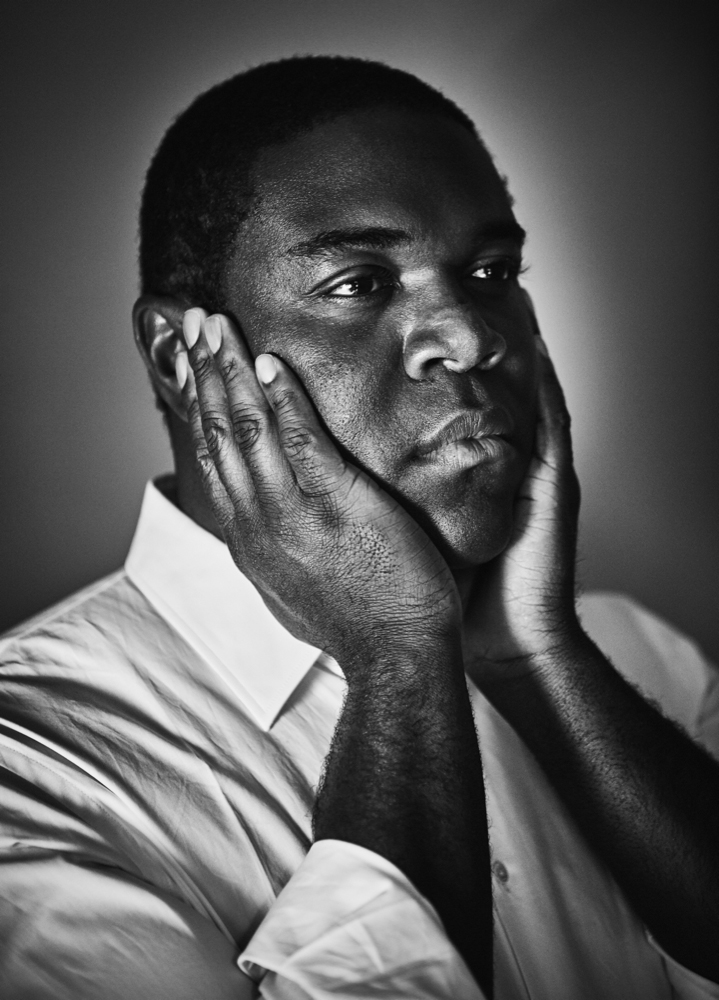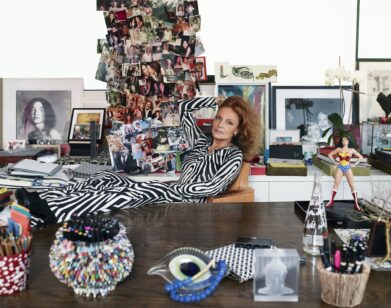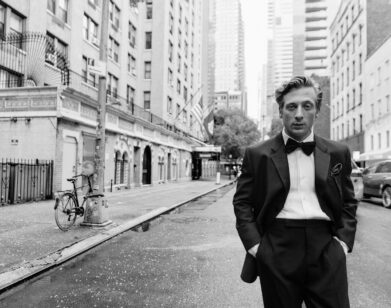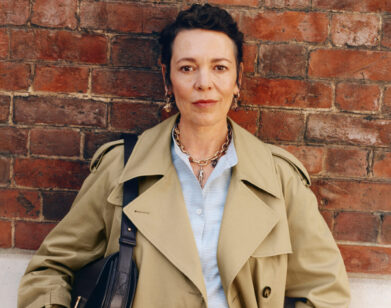Sam Richardson
SAM RICHARDSON IN NEW YORK, JUNE 2017. PHOTOS: DAVID NEEDLEMAN/JONES MANAGEMENT. STYLING: JOSHUA LIEBMAN/HONEY ARTISTS. GROOMING: LAURA DE LEON FOR JOE MANAGEMENT USING CHANEL. PHOTO ASSISTANT: JASON ZEREN. RETOUCHING: FEATHER CREATIVE.
“If it wasn’t acting, I would maybe try and be some sort of a sleuth or independent homicide detective,” says Sam Richardson. “I’d get to the crime scene: ‘Richardson! You have no jurisdiction. You’re not a police officer,’ and I’d be like, ‘Let me just take a look. From the blood splatter there, your killer is 5’6″, 215 pounds, and he goes by the name of John Clark.’ He’d be the guy across the street and he’d start to run, and I’d say a quip and maybe roll a tire or something to catch him. Case solved.”
An alumnus of Second City, Sam Richardson has an active imagination. In addition to playing the hapless (but eternally hopeful) political aide Richard Splett on Veep, Richardson co-writes, produces, and stars in his own Comedy Central sitcom, Detroiters, set in his hometown. Yesterday, Season Six of Veep concluded on HBO; next month, Richardson will start filming the second season of Detroiters. Starting next weekend, you can see him in The House alongside Amy Poehler, Will Ferrell, and Jeremy Renner. “I took my first vacation in over 10 years about a month ago,” Richardson admits with a laugh.
EMMA BROWN: You came up in the comedy world through Chicago.
SAM RICHARSON: I did, through Second City in Chicago. I came through Second City in Detroit first—made my way through classes—and then came up through Chicago after working on a cruise ship for a year.
BROWN: What did you do on the cruise ship?
RICHARDSON: Second City—improv and sketches. The cruise would go through the Caribbean; we’d go to Tortola, Barbados, St. Lucia. It was incredible. I was 21, 22, and I did that for a year. You’d work for five hours a week doing shows and the rest of the time was my own, so I just lived on this cruise ship barely doing comedy. [laughs] It was really fun, but I kind of felt myself starting to atrophy. Then they hired me to the touring company in Chicago and I came up through there to the main stage and out to L.A.
BROWN: What was the audience like on the cruise ship? Was it more families or old people?
RICHARDSON: Families and old people. [laughs] Midwesterners and New York and New Jersey people.
BROWN: I have a somewhat unfounded fear of cruise ships because I once read an article in The Guardian about people mysteriously disappearing off of them. Also because of norovirus.
RICHARDSON: [laughs] I did have this impending sense of doom the whole time I was there. At one point I was out on the deck and I was like, “There’s nothing but ocean here.” What if a kraken was real—or some sort giant monster—what would you do? You couldn’t go anywhere. Being in the lower cabins, you just see ocean at night. There’s just nothing. And I know cruise ships don’t really go out into the middle of the ocean, but it definitely gives you perspective on the fact that you can’t have full perspective. It’s so big. I definitely got this uneasy feeling: “I think this is where I might die.” [laughs] But I didn’t. At least, I don’t think I did. Maybe this is all just death gasp.
BROWN: This is heaven. So then you joined the touring company.
RICHARDSON: Yeah, I got hired by the touring company in Chicago and we toured all over the States. I did that for two years. It was really fun. It gave me a great perspective on different audiences. Performing in Detroit or performing in Chicago, you’re on your own turf, but when you tour a show, the audiences change. You’re in a completely different space; sensibilities change. I think I learned a lot from doing that—how written material works in different places, learning to have confidence, learning the idea of how to be adaptable. But also to not be a chameleon entirely. Like, “Oh I’m in Texas? I’m only going to do gun jokes.” [laughs] It’s being confident in the stuff that you do. It’s a very valuable lesson, I think.
BROWN: When did you move to L.A.?
RICHARDSON: I moved to L.A. in February of 2012. I was very lucky pretty early on, to get to be on the new season of Arrested Development and then The Office all in my first year in L.A. Then I got Veep the next year. It was very helpful in living. Allison Jones was the casting director of those shows and had seen me in shows with Second City. As soon as I got to L.A., she was like, “We will get you working,” but I would have never believed it would be to that degree on those amazing shows.
BROWN: I want to talk about Veep and Richard. The show has gotten more cynical of the years, as the world has gotten more cynical, and Richard is a breath of fresh air.
RICHARDSON: There’s not an ounce of cynicism in Richard. He just smiles, and doesn’t even really fail upwards, but manages to float. That niceness and that positivity make him buoyant. [laughs]
BROWN: I don’t think he’s less competent than any of the other characters.
RICHARDSON: He might even be more competent. He’s got his degrees: a doctorate in voting procedures and a doctorate in veterinary medicine. He just has all this expertise and can do a lot of things. The things he can’t do he has this confidence to at least try.
BROWN: When you first got cast as Richard, how many episodes did you sign on to do?
RICHARDSON: When I first got the role, it was for one episode. Then the rehearsal process was so much fun and filming was so much fun that they wrote me into the next episode. They just kept on saying, “We’re going to bring you back.” They brought me back for the last episode of that season, and then made me a regular. It just blended so well. My training at Second City—the improv and the re-improvisation—is what made me fit over there very well. That’s kind of how the rehearsal process goes: you do the table read, and then you put the scripts aside and re-improvise the scenes. The writers take notes and folds in the improvisations.
BROWN: Do you have an idea of where Richard will be in five years?
RICHARDSON: Either he’ll keep on floating up, or he’ll be the president of a zoo. Maybe he’ll be doing some really positive work somewhere. Maybe he’ll just be a vet.
BROWN: Did you grow up in a particularly creative family?
RICHARDSON: No, not really. I’m really the only artist in my family. I have one cousin who is a painter. I think I developed all of that from television and books—from being, essentially, an only child. I’m my mom’s only child and my dad’s fourth child, but separated by 14 years.
BROWN: Do you feel like that made you grow up faster? Did your parents treat your more like an adult?
RICHARDSON: I think so. I think you grow up fast because you have to learn to adapt to your surroundings and because there’s no one really to bounce ideas off of who is your peer. When you grow up with siblings, you can be like, “Isn’t this weird? Isn’t this funny? Do we agree on this, or do we disagree?” You have some point of reference, some touchstone. When you grow up an only child, everything is internalized. My mom is from Ghana and my dad is from Detroit, so I would go back and forth to Africa a lot. Not having a sibling to bounce ideas off of just makes you find the answers on your own.
BROWN: You also have Detroiters, which you co-created and co-write with Tim Robinson, Zach Kanin, and Joe Kelly, and also star in. At what point did you first start thinking about creating the show?
RICHARDSON: Tim [Robinson] and I moved to Chicago at the same time from Detroit; we were friends in Detroit. The whole time we were like, “Wouldn’t it be great to go back to Detroit with something?” Just pipe dreaming. Then we got hired to do the main stage [at Second City] and we worked every day together. We were already as chummy as you could be, but then working together seven days a week, all we would do is sleep separately. [laughs] Tim went to do Saturday Night Live in New York, and I moved to L.A. Jason Sudeikis, who was working with Tim at the time and who we had known through Second City, offered to produce our show. So we were like, “Great, let’s get this going!” We got Joe and Zach together and started pitching. This was my first show that’s a narrative, not a sketch comedy, so it was a lot of learning how to do it as we did it. We’re still learning. We’re writing the second season right now, and there are still structural things where we’re like, “Oh, we need this in order to make this work.”
BROWN: Do you ever have any disagreements about what direction the show should go in? And, if so, how do you decide them?
RICHARDSON: There are four creators, so you’re definitely going to push and pull in different directions sometimes. It’s just all compromise. Really trying to find what the voice of the show is and try and be agreement on that. If the laugh is there that helps, and if it feels true to the characters.







